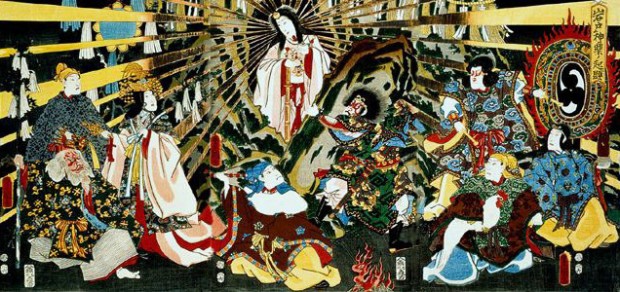
In Boston, clouds and swirling snow deprived us of the sight of a blood-red lunar eclipse on the eve of solstice. The two phenomena have nothing to do with one another astronomically; but as a member of a species drawn to pattern like moths to lamplight, I felt the urge to seek an open patch in the clouds, even at three o’clock in the morning�to no avail. This afternoon, however, I was trying to decide whether to make my next post about net neutrality or a piece of kinetic sculpture when I looked up from my computer to the west-facing window and noticed the fading sunlight peering through the trees’ bare banisters. I leaped up, threw on my running kit, and dashed out the door to catch a glimpse of the sun setting on the shortest day of the year.
The highest point in my neighborhood lies in the wooded edge of Forest Hills Cemetery, atop a jumbled drumlin of Roxbury puddingstone�a metamorphic conglomerate, a plum-colored cobble that is the area’s characteristic rock, forged in cataclysms far greater than the annual shortening of the days. Here the ranks of stones and little hamlets of mausoleums give way to a tumulus of rock-shard and leaflitter, an open wood of spruce and maple. Crunching to a stop atop a snowy table of moss and broken stone, I watched the sun’s crescent wink out over the hills of Roslindale, turning the sky into a great bowl of garnet and lapis and gold.
Turning, I threaded a path through the glowering trees, making my way back into the open cemetery, passing a monument to John Eliot, the seventeenth-century Puritan minister and “apostle to the Indians.” Eliot knew the Age of Discovery’s clash of cosmology firsthand�indeed he reveled in it. His record as a missionary is fraught and difficult to parse: he forced his faith upon the native peoples of Massachusetts, and yet he fought to preserve their language and with it, however attenuated�a measure of their world, its ways and rhythms. He would brook no dissent from his gospel-driven view of the world, and yet from within its compass he doubtless stirred to the same quotidian patterns and symmetries that moved the Indians he sought to convert. Eliot and the Indians were worlds apart�and yet from our standpoint, they also shared a measure of time, experience, and enchantment we too readily deem lost in our technological time.
The leaves on Eliot’s memorial oak glowed palely in the fading day. I ran on, smitten with the worlds and times that come together at calendar’s end. Light is kindled and extinguished, life flickers and ebbs; great forces hold themselves in tense balance. In fact, the swirling orb continues to tilt, and the gods’ supercilious epicycles dissolve into epiphenomena, artifacts of the appearances, a fickle endowment of fortune and evolution. And yet as I cruised amidst the unfeeling graves and their garlands of snow, I couldn’t help thrilling to the realization that with disenchantment comes the liberty to revel even in the dying of the light.
 Gearfuse Technology, Science, Culture & More
Gearfuse Technology, Science, Culture & More


